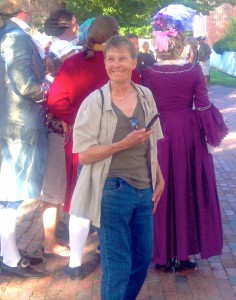
Welcome to “Behind the Byline,” the column in which we share conversations with current NER writers in all genres.
NER editor Carolyn Kuebler speaks with Carolyn Page, author of the story “Marksberry Road” which appears in NER 36.1.
CK: This story first struck me by its perfectly matter-of-fact tone and then later by a haunting sense of pain and loss. It’s as if the narrator recognizes that her losses are so ordinary that she hardly seems entitled to express her own pain. Where did this narrator and her story come from?
CP: All I know is that when my mother died in 1997 it threw me back onto Marksberry Road where my father had died 45 years before. The story, which had had one or more unsuccessful incarnations over the years, came to life then and pretty much wrote itself.
The child in the story may be the key to the attitude you mention. Children are innocent. They see things simply. You can trust them. A child isn’t questioned or second-guessed by the reader the way an adult might be, so a reader would be more willing to listen to the story unfold and trust in the accuracy and believability of it from a child’s point of view.
CK: You mentioned in conversation that you enjoy listening to voices, in particular speaking voices, from books on tape and even just people on the phone. Could you tell us about this, and about how it might inform your writing?
CP: A voice can tell us an awful lot if we just listen, especially if we hear it out of view of the speaker, disembodied, and also when what is being said is not for our ears and the speaker doesn’t know we are there, listening. Voices have value in other ways, too. Lying in the dark listening to an audio production of Hamlet did more for my migraines years ago than the dangerous barbiturates prescribed by my doctor.
CK: The changes on Marksberry Road reflect the loss of a mundane but very particular (and beloved) way of life, and help remind us that so many “nowhere” places are as deeply loved as the world’s spectacular places. Does the place you live in now allow you to more clearly see the place you once lived?
CP: Actually, if any place does that for me it’s Colonial Williamsburg, a day trip from where I live now. The quiet, simple way of life depicted there, with vegetable gardens in the back and side yards of clapboard houses, is very like where I grew up. Even the horses contribute; after all, I grew up in Kentucky.
CK: I was particularly taken by the descriptions of the church picnic. Do picnics like this still exist?
CP: I’ll say! Just go to Stanley, Kentucky, in August and you will find plenty of barbecued mutton and burgoo at the St. Peter of Alcantara church picnic. There are others down there, I’m sure. I just don’t know where.
CK: What writers have you been most drawn to over your life as a reader, and who are you reading these days?
CP: Shakespeare and Faulkner, then everyone else. These days, I mostly reread the greats and near greats for fiction and also for nonfiction, such as Hemingway’s relatively overlooked and wonderful Green Hills of Africa and books on writing and writers for other nonfiction, mostly the older, long out-of-print works; looking for them and finding them is like a treasure hunt. One such treasure is The Essential Shakespeare by John Dover Wilson, one of the giants of Shakespeare critique, long gone now but unparalleled. His humble little brown book got me excited about Shakespeare’s comedies when before I had not had much interest. I keep up with all contemporary fiction and nonfiction, and always give it a try, but I end up returning to the classics, after all.
♦♦♦
Carolyn Page was born in Kentucky and has lived in Arlington, Virginia, most of her adult life. She is a mother of four, grandmother of nine, and a great grandmother. She won the PEN/Nelson Algren Fiction Award in 1989 along with a month-long writing residency at The Barn, Montauk, New York. The prologue to the PEN Award–winning novel, a standalone story, “Bucky,” was published in the Potomac Review and nominated for the Pushcart Prize. She has taught creative writing in the Washington, DC, area for twenty-five years.